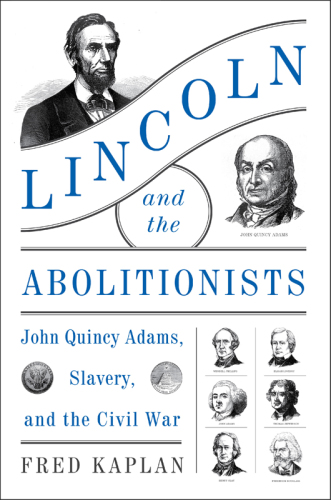
Lincoln and the Abolitionists
John Quincy Adams, Slavery, and the Civil War
کتاب های مرتبط
- اطلاعات
- نقد و بررسی
- دیدگاه کاربران
نقد و بررسی

April 24, 2017
In this elegantly written and thoroughly researched book, Kaplan (John Quincy Adams: American Visionary), professor emeritus of English at Queens College, relates how two presidents, Abraham Lincoln and John Quincy Adams, thought about and dealt with slavery and race. Lincoln believed that African-Americans should emigrate to Africa or another homeland. Adams, meanwhile, was an ardent abolitionist who foresaw the eventual rise of a multicultural America. Kaplan contrasts their views and discusses the people and events that shaped their intellectual, political, and moral development. Among these figures is Dorcas Allen, an enslaved woman who killed her two children and whose trial ignited Adams’s passion against the peculiar institution, which reached its apotheosis in the famous Amistad trial of 1841. The murder of the impassioned antislavery preacher Elijah Lovejoy in 1837 in Alton, Ill., was influential in forming Lincoln’s opinions about African-Americans, slavery, and the law. The procolonization ideas of Sen. Henry Clay, Thomas Jefferson’s dour views on black intellectual capacity, and Frederick Douglass’s opposition to colonization also come under consideration. Kaplan presents a more complex Lincoln who “presided over the creation of a new reality that neither he nor anyone could fully embrace, or embrace in a way that would eliminate racial conflict.” Agent: Georges Borchardt, Georges Borchardt Inc.

Starred review from May 1, 2017
A fresh look at John Quincy Adams, Abraham Lincoln, the Civil War, abolitionism, and other related American history.The great 19th-century champion of black equality was not Lincoln, writes Kaplan (Emeritus, English/Queens Coll.; John Quincy Adams: American Visionary, 2014, etc.), who has authored biographies of both of his principal figures. In this insightful, often disturbing dual biography, he makes a convincing case that Adams, working decades before Lincoln, was the real hero. The ex-president returned to Washington as a member of the House of Representatives in 1830. He never liked slavery, but it was not a priority during his presidency. In 1836, enraged by anti-slavery petitions, Southern representatives passed the legendary "gag rule" that forbade their discussion. Galvanized to action, Adams fought, eventually successfully, to overturn it, thereby becoming abolition's leading spokesman until his death. Kaplan emphasizes that, unlike all other great men who disapproved of slavery (from Jefferson to Lincoln), Adams never qualified his opposition with racist rhetoric. A consummate politician, Lincoln could not offend Illinois voters who overwhelmingly considered blacks subhuman and loathed abolitionists. Lincoln publicly agreed, but his private writings give little comfort. He opposed slavery on humanitarian grounds, but, unlike Adams, "Lincoln would not go the next step...from antislavery moralism to antislavery activism." As the Civil War raged, Lincoln fended off abolitionists, aware that most Northerners continued to despise them. The Emancipation Proclamation, a feeble step, was, as he feared, widely unpopular, but it was also the beginning of the end of the practice of slavery. This is accepted history, but readers accustomed to the worshipful History Channel view will squirm to learn that Lincoln never believed that blacks could live among whites as equals. Adams believed, and Kaplan drives this home in a fine portrait of a great man far ahead of his time. An eye-opening biography from a trusted source on the topic.
COPYRIGHT(2017) Kirkus Reviews, ALL RIGHTS RESERVED.

June 1, 2017
Kaplan (English, Queens Coll.; Graduate Ctr., CUNY; Lincoln: The Biography of a Writer) compares how Presidents John Quincy Adams (1767-1848) and Abraham Lincoln (1809-65) viewed race, slavery, party politics, and the sanctity of the Union. He casts Adams as a true abolitionist and Lincoln as a reluctant one. After long digressions into the histories of the Adams and Lincoln families, and lengthy context on Whig interests both men shared, Kaplan suggests Adams developed a steely resolve in supporting abolition, a resolve Lincoln lacked. He also maintains that Adams could imagine a multicultural society after emancipation while Lincoln balked at such, distrusting abolitionists for their excesses and arguing for the colonization of African Americans as an end to slavery. Kaplan speculates how a more forceful abolitionist stance by Lincoln could have led to more successes in the Civil War, ending slavery earlier, and softening racism. Ultimately, he concludes that Lincoln's failure to be decisive doomed Reconstruction. VERDICT While not all readers will agree with the author's insights, his arguments about Adams's foresight into slavery's violent end will find many takers. Kaplan effectively demonstrates how moral courage must be the true measure of leadership.--Randall M. Miller, St. Joseph's Univ., Philadelphia
Copyright 2017 Library Journal, LLC Used with permission.

Starred review from June 1, 2017
Americans remember Abraham Lincoln as a warrior against slavery and a martyr to the cause of its extermination, but as Kaplan (John Quincy Adams, 2014) shows in his new book, Lincoln's decision to emancipate the slaves came after a long struggle with the South's slaveholding elite and his own evolving beliefs. Kaplan has published acclaimed biographies of both Lincoln and John Quincy Adams, and his knowledge of both frees him to tell their intertwining stories with clarity and concision. While Lincoln was a conciliator, Adams was a truth-teller, and after serving as secretary of state and president, Adams, who died serving in Congress, was unafraid to speak out against slavery. Early in the nineteenth century, Adams already believed that slavery would be ended only through a civil war, but Lincoln believed abolitionism would destroy the union and set off a hundred years or more of volatile racism. Only when Lincoln concluded that freeing the slaves would wreck the Southern economy and free black men to join the Union army did he change his mind. Kaplan does not build up one man at the expense of the other but shows how both helped liberate our country from a horrifying institution.(Reprinted with permission of Booklist, copyright 2017, American Library Association.)

























دیدگاه کاربران